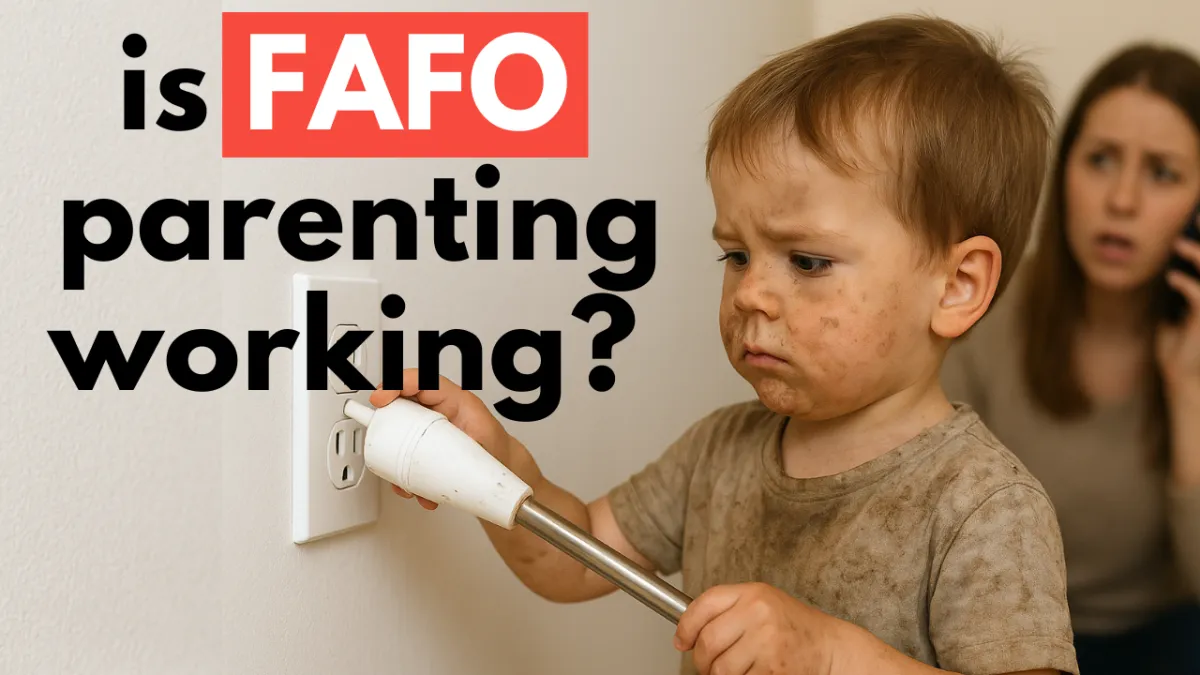
Is F* Around and Find Out Parenting All It's Cracked Up to Be?


Have you heard of “FAFO Parenting” and thought: Finally! A parenting style that doesn’t require me to be a perfect gentle parent 24/7?
If so, you’re not alone.
More and more parents are feeling exhausted by the emotional labor of parenting and looking for a straightforward, no-nonsense approach. FAFO (short for “F*** Around and Find Out”) promises just that.
But here’s the problem: not all consequences are created equal.
Handled the wrong way, they can damage your relationship with your child, lead to anxiety or disconnection, and undermine the very resilience you’re trying to build.
Let’s unpack what FAFO parenting is, what the research says, and whether it can actually create confident, capable kids.
What is FAFO Parenting?
Popularized after a viral Wall Street Journal article, FAFO parenting is based on a simple premise:
Let kids test limits (“F around”) and then experience the results (“find out”) through natural and logical consequences.
Some real-life examples:
Forget your lunch? You feel hunger at school.
Don’t brush your teeth? You hear it from the dentist.
Leave your bike outside? It rusts or gets stolen.
Procrastinate on a project? You feel the stress and get a lower grade.
On the surface, this seems like the antidote to overly soft, permissive parenting—and for burned-out parents, it can feel like relief.
But let’s look deeper…
What FAFO Parenting Gets Right
FAFO isn’t all wrong. In fact, several of its core ideas are supported by research:
Autonomy Works
Kids who are given age-appropriate freedom and choices tend to be more emotionally stable and adaptable. Over-controlling parenting has been linked to anxiety, depression, and poor coping.
Natural & Logical Consequences Are Effective
These types of discipline when tied directly to the behavior are consistently rated as the most effective by both parents and children. They're clear, consistent, and support mental health.
Experiential Learning > Endless Lectures
Kids (especially younger ones) often learn better from real-world experience than long-winded explanations. Feeling cold without a coat teaches more than being told 10 times.
Where FAFO Parenting Misses the Mark
While it gets the autonomy piece right, FAFO often fails to include emotional connection—and that’s where it falls apart developmentally.
No Warmth = No Learning
Consequences delivered with sarcasm, shaming, or “I told you so” energy don’t build resilience—they break trust. Children learn best when they feel safe and connected, even in moments of discipline.
Extreme Examples Are Harmful
Some viral FAFO moments (like throwing kids into ponds or biting them back) promote physical aggression, which teaches kids that violence solves problems. Research clearly shows this is damaging.
It Ignores Developmental Readiness
FAFO assumes kids can solve problems on their own—but young brains aren’t fully equipped yet. Executive function, emotional regulation, and problem-solving all develop over time.
What’s the Alternative? Authoritative Parenting.
Authoritative parenting takes the best parts of FAFO—freedom, natural consequences, real-world learning and balances them with the guidance and warmth developing brains need.
It’s the gold standard in child development research and the foundation of my parent coaching program.
Authoritative Parents:
Use consequences, but with empathy.
Give age-appropriate choices with guidance.
Teach skills before issues arise (like role-playing conflict resolution or practicing routines).
Combine emotional coaching with firm expectations.
Example:
“I see you're frustrated about losing video game time. It’s hard to feel angry. Let’s talk about what you can do differently next time. Video game time will reset tomorrow.”
This teaches both accountability and emotional intelligence without shaming or coddling.
Gentle vs. FAFO vs. What Actually Works
Social media paints parenting like a war between two camps:
💗 Gentle Parenting (all feelings, no consequences)
🔥 FAFO Parenting (all consequences, no feelings)
But that’s a false choice.
Real, effective parenting doesn’t live in extremes.
It’s about understanding your child’s development and responding with the right mix of boundaries, empathy, structure, and support.
So, Should You Let Your Kids “Find Out”?
Yes—and no.
✅ Let them feel natural consequences
✅ Give them autonomy when appropriate
✅ Don’t rescue them from every uncomfortable feeling
But also…
💗 Provide warmth
💬 Offer guidance
🧠 Support their skill-building
Your job isn’t just to toughen them up for the world, it’s to help them develop the tools, mindset, and emotional safety they’ll need for life.
Final Thoughts: You Don’t Have to Choose Sides
You’re not a bad parent for wanting to stop over-functioning.
You’re not a pushover for caring about your child’s feelings.
You can do both.
The goal isn’t to find the “perfect parenting style.” It’s to raise confident, capable, emotionally intelligent humans. And research is clear: that happens when we blend structure and love.
